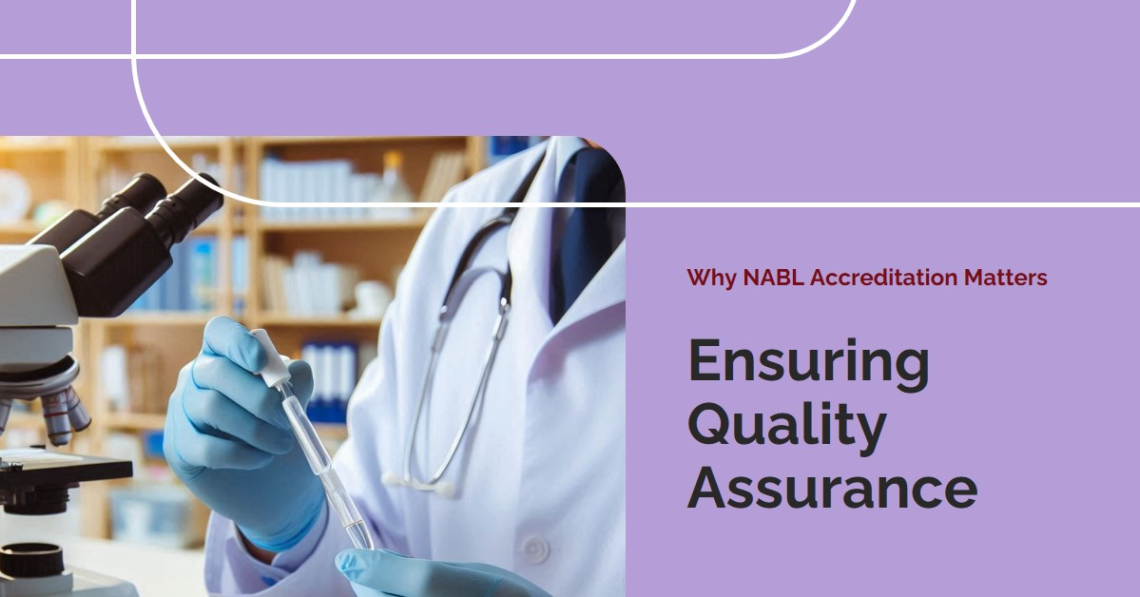In today’s world, quality and precision are critical in various industries, from healthcare to manufacturing. When it comes to testing and calibration, the accuracy of results is non-negotiable. This is where NABL accredited laboratories come into play, ensuring that test reports and calibrations meet stringent quality standards. In this blog, we’ll explore the importance of NABL accreditation, the benefits of choosing a NABL accredited laboratory, and why it’s a cornerstone of quality assurance for businesses and individuals alike.
What is NABL Accreditation?
The National Accreditation Board for Testing and Calibration Laboratories (NABL) is an autonomous body under the Quality Council of India (QCI). It provides third-party accreditation services to testing and calibration laboratories, ensuring that they adhere to international standards. NABL’s accreditation is based on the guidelines laid out by ISO/IEC 17025, which is recognized globally for testing and calibration competencies.
In simpler terms, a NABL accredited laboratory is one that has undergone rigorous audits, evaluations, and assessments to confirm its ability to produce accurate, reliable, and consistent test results.
Why Choose a NABL Accredited Laboratory?
- Guaranteed Accuracy and Precision A NABL accredited laboratory operates under strict protocols and procedures that ensure test results are reliable. The certification process includes thorough audits of the laboratory’s testing methods, equipment calibration, and the qualifications of personnel. By choosing a NABL accredited laboratory, you can trust that the results are accurate and meet international standards.
- Global Recognition NABL accreditation follows the ISO/IEC 17025 standard, which is accepted worldwide. This ensures that test reports and calibration certificates from NABL accredited laboratories are recognized internationally. For businesses that operate on a global scale, using a NABL accredited laboratory can enhance credibility with international clients and regulatory bodies.
- Compliance with Regulatory Requirements Many industries, especially in healthcare, pharmaceuticals, and manufacturing, require testing and calibration to be done by accredited laboratories to comply with national and international regulations. NABL accredited laboratories help businesses ensure that they meet these regulatory requirements, avoiding potential legal and financial risks.
- Enhanced Customer Confidence In industries like healthcare, where patient safety is paramount, using a NABL accredited laboratory boosts trust. Clients and patients are assured that the test results are reliable, leading to better outcomes and reduced risk of errors. This translates into improved brand reputation and customer satisfaction.
- Reduced Risk of Errors Laboratories with NABL accreditation are required to follow stringent quality management systems, which minimize the risk of errors in testing and calibration processes. The accreditation body also conducts periodic reassessments to ensure continued compliance, thus maintaining the highest standards of accuracy over time.
How Does NABL Accreditation Work?
To achieve NABL accreditation, laboratories must undergo a detailed assessment process, which includes:
- Application and Documentation: Laboratories submit an application along with documentation that details their testing or calibration procedures, equipment used, and staff qualifications.
- Initial Assessment: NABL appoints auditors who visit the laboratory to assess the testing environment, review procedures, and ensure compliance with ISO/IEC 17025 standards. This includes an evaluation of the laboratory’s technical competence and management system.
- Corrective Actions: If any non-conformities are found during the audit, the laboratory must take corrective actions to resolve these issues. A follow-up audit is conducted to verify compliance.
- Final Accreditation: Once the laboratory meets all the requirements, NABL grants accreditation, and the laboratory receives a certificate of accreditation valid for a specific period, usually two years.
Sectors Benefiting from NABL Accreditation
NABL accredited laboratories serve a wide range of industries. Some of the key sectors include:
- Healthcare and Diagnostics Laboratories involved in medical testing, such as pathology and clinical diagnostics, benefit significantly from NABL accreditation. Accurate test results are crucial for patient care, and NABL accreditation ensures the reliability of tests like blood tests, imaging, and genetic testing.
- Pharmaceuticals The pharmaceutical industry relies heavily on testing for drug safety, efficacy, and quality control. NABL accreditation ensures that drug formulations and manufacturing processes are compliant with international quality standards, reducing the risk of substandard or unsafe drugs reaching the market.
- Environmental Testing Laboratories that test air, water, and soil samples for environmental contamination need NABL accreditation to ensure accurate and legally compliant test results. This is critical for environmental monitoring and regulation compliance.
- Food and Agriculture Food testing laboratories that evaluate food safety, quality, and contamination require NABL accreditation to meet national and international food safety standards. This is particularly important in sectors like export, where stringent safety regulations are in place.
- Engineering and Manufacturing In industries such as automotive, aerospace, and electronics, precise calibration and testing are essential for product safety and performance. NABL accredited laboratories offer calibration services for measuring instruments and testing services for product quality assurance.
The Economic Impact of NABL Accreditation
NABL accreditation not only guarantees quality but also has an economic impact. According to a study published by the Quality Council of India, laboratories that are NABL accredited show improved operational efficiency and reduced operational costs due to fewer errors and less rework. Additionally, businesses that use NABL accredited laboratories can reduce product recalls and liability risks, leading to financial savings.
Moreover, NABL accreditation enhances the global competitiveness of Indian laboratories, particularly in industries where international trade plays a major role, such as pharmaceuticals and food exports.
How to Find a NABL Accredited Laboratory
NABL provides an official directory of accredited laboratories, which is accessible online. Customers can search for laboratories based on location, services provided, and the scope of accreditation. This directory is an essential tool for businesses and individuals seeking reliable and accredited testing or calibration services.
Future Trends in NABL Accreditation
With technological advancements and increased demand for high-quality testing and calibration, NABL is continually evolving to keep pace with industry changes. Some of the trends shaping the future of NABL accreditation include:
- Digital Transformation: Many laboratories are incorporating digital technologies like AI, automation, and machine learning to enhance testing accuracy and reduce turnaround times. NABL is adapting its accreditation criteria to include these new methodologies.
- Remote Audits: The COVID-19 pandemic accelerated the adoption of remote audits and virtual assessments. NABL has introduced remote audit protocols to ensure continued compliance while reducing the logistical challenges of physical audits.
- Green Laboratories: Environmental sustainability is becoming a priority, and NABL is considering incorporating eco-friendly practices into its accreditation criteria for laboratories.
FAQs About NABL Accredited Laboratories
- What does NABL accreditation mean for a laboratory? NABL accreditation means that a laboratory has demonstrated technical competence and follows internationally recognized standards for testing and calibration services.
- Why is NABL accreditation important for industries like healthcare and pharmaceuticals? NABL accreditation ensures accuracy, reliability, and compliance with regulatory standards, which are essential for patient safety and drug efficacy in healthcare and pharmaceutical industries.
- How long does NABL accreditation last? NABL accreditation is typically valid for two years, after which laboratories must undergo reassessment to maintain their accredited status.
- What is the difference between NABL accreditation and ISO certification? NABL accreditation specifically evaluates the technical competence of testing and calibration laboratories, while ISO certification focuses on the management systems of organizations.
- How can a laboratory become NABL accredited? Laboratories must submit an application, undergo a detailed audit, address any non-conformities, and meet the requirements of ISO/IEC 17025 to receive NABL accreditation.
Conclusion: Is Your Laboratory NABL Accredited?
Choosing a NABL accredited laboratory is essential for businesses and individuals seeking reliable, accurate, and globally recognized test results. Whether you are in healthcare, manufacturing, or environmental testing, working with a NABL accredited laboratory ensures compliance with regulatory standards, enhances customer trust, and reduces operational risks.
Are you ready to make quality assurance a priority? Choose a NABL accredited laboratory today!
Also know NABL Accredited Labs in Bangalore: The Ultimate Guide to Quality Testing





